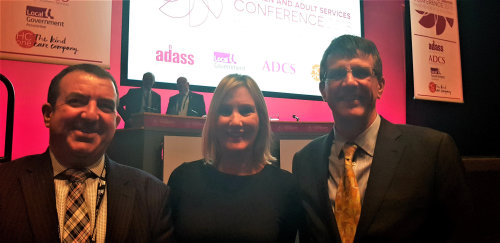Shropshire Council selected to pioneer cutting edge adult social care technology
Shropshire Council has today been chosen to take forward a project to develop a data visualisation tool to allow care homes and home care organisations identify key areas of need.
The announcement was made by the Minister for Care Caroline Dinenage at the National Children and Adult Social Services’ Conference today in Manchester.

Left to right – Andy Begley, Minister for Care Caroline Dinenage and Councillor Lee Chapman
The minister announced the nine local authorities who will be piloting digital projects as part of a government funded programme exploring how technology can help shape the future of social care. The nine successful councils in the Social Care Digital Innovation Programme are: Bracknell Forest, Havering, Isle of Wight, Lincolnshire, Nottingham, Shropshire, Stockport, Sunderland and the Wirral.
Earlier this year Shropshire was one twelve councils who were awarded £20,000 each in the first ‘discovery’ phase of funding, to investigate local challenges that could be addressed using digital technology. Nine of these projects have now been chosen to design and implement their solution and they will receive a share of up to £700,000.
Shropshire was chosen for its data visualisation tool to assist the care home and domiciliary care market identify key areas of need in a locality by aggregating data to improve commissioning approaches.
Previously called The RECap programme ‘The Bridge’ is being delivered in partnership with West Midlands ADASS and local partners from across Shropshire. The programme focuses on combining large data sets and applying predictive analytics and other data methods, to better understand the current demand in social care, to enable organisations to predict and prevent future demand. This approach will help inform the way the council and its partners commission services in the future.
Councillor Lee Chapman Cabinet Member for Adult Social Care, Health and Housing said;
“I am absolutely delighted that our digital visualisation project has been chosen to go forward to the next phase of the Social Care Digital Innovation Programme. This is testament to the hard work and innovation of our officers and partners who are developing pioneering work to help address and resolve the social care challenges we face.
“I would like to thank NHS Digital and Local Government Association for giving us this opportunity to further develop our work. Our programme will provide us with the insight and tools to predict and prevent crisis by addressing the needs of older and vulnerable people, and those with chronic diseases much earlier, and help keep them safe and well in their own homes for longer.“
Andy Begley Director of Adult Social Care and Housing and Chair of West Midlands Association of Directors of Adult Social Services (ADASS) added;
“This is fantastic news! Our digital visualisation programme looks to address the growing demand in social care by working with providers to co-design a system and help promote people’s health and wellbeing. This is so they do not deteriorate to the point where they need extensive and costly support. It does this by combining large data sets and applying predictive analytics, machine learning and data modelling to better understand current demand, predict and prevent future demand.
“To date, the project has gained a deeper insight into digital technology. By using this insight alongside big data from health and social care, it allows us to better understand and strengthen the provider markets and gain deeper and more insightful profiles of our communities. This will allow care homes and home care organisations to identify key areas of need.”
The initiative, funded by NHS Digital and managed by the Local Government Association, is dedicated to enhancing practice, improving information sharing and spurring greater health and care integration and the learning from the pilot sites will be shared across the country.
Minister for Care Caroline Dinenage said today in her speech:
“Cutting edge technologies, such as AI and robotics, offer exciting new opportunities for the care sector.
“For example, virtual assistants, now in many homes across the country, can help people live more independently, reduce their social isolation and maintain their dignity through better self-management of health and care needs at home.
“Exploring these possibilities does not mean we are seeking to substitute technology for people. We know that the best technology liberates and enhances human interaction, it doesn’t side-line or exclude it.
The Minister continued;
“We need to share and build on all this best practice happening across the country; and where it has been proven to work, we must scale it.
“Innovative approaches like these can make this country a world leader for domestic and care home adapted living, whilst also encouraging flexible, inclusive, connected communities fit for multiple generations.”
Further information
Other projects in the Social Care Digital Innovation Programme include:
- The Isle of Wight, where they are exploring the potential role of robotics and how to win consumer support for cutting edge care and support solutions.
- In Stockport, where authorities will look at ways to expand assistive home-based technology, including products linked to monitoring centres or devices used by family carers.
- In the Wirral the project will untap digital tech’s potential to help people with autism develop their own health and wellbeing solutions and will also explore the role of biometrics to pre-empt care needs.

